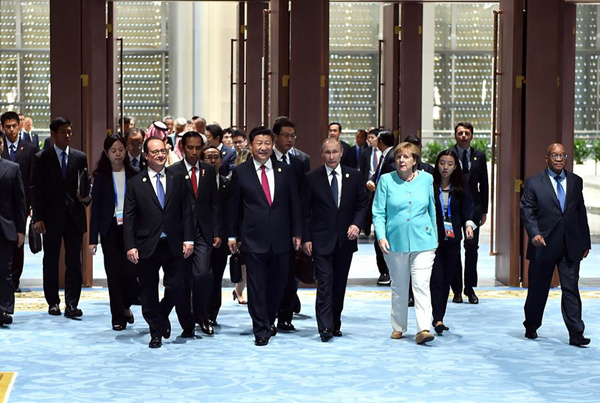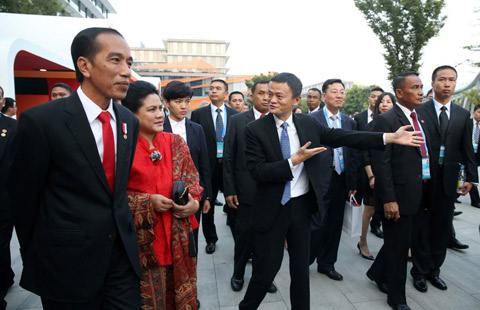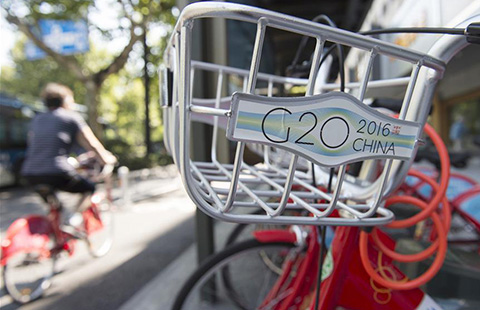Xi takes world's center stage at G20 summit
(Xinhua) Updated: 2016-09-05 02:03
 |
|
Chinese President Xi Jinping and other leaders of the Group of 20 (G20) members, some guest countries and international organizations walk into the venue of the G20 summit in Hangzhou, capital of east China's Zhejiang province, September 4, 2016. [Photo/Xinhua] |
With the theme of "Toward an Innovative, Invigorated, Interconnected and Inclusive World Economy," the summit has put the issue of development at the front and center of the global macro policy framework for the first time.
It is also the first time that the G20 has an action plan for implementing the 2030 Agenda for Sustainable Development, and will discuss the industrialization of Africa and the least developed countries.
Chairing the G20 also offers China a unique opportunity to participate in the top-level design of global economic governance.
One of the goals of China's G20 presidency is to push the group to transform from a crisis response mechanism focused on short-term policies to one of long-term governance that shapes medium- to long-term policies.
With two-thirds of the world's population, G20 contributes about 90 percent of the world's total gross domestic product and 80 percent of the world's trade volume. Now, the G20 has become the premium forum of global economic cooperation.
China's increasing involvement in the G20, and in global governance in general, evolved gradually.
Eight years ago when the first G20 summit was held in Washington amid a major global financial crisis, global governance was anything but a familiar term to most Chinese. Chinese leaders back then repeatedly said China's biggest contribution to the world would be getting its own house in order.
In fact, global governance only entered the official Chinese political parlance in the wake of the 2008 crisis, and it was Xi who, years later, accredited the term its due prominence.
Attending a BRICS summit in South Africa in March 2013, about two weeks after assuming the presidency, Xi spoke of the need for emerging economies to take part in global governance, to uphold international fairness and justice and safeguard world peace and stability.
"No matter how the reform of the global governance system may unfold, we should always take an active and constructive part in the process," Xi said.
In the words of Wang Wen, executive dean of Chongyang Institute for Financial Studies under Renmin University of China, "Xi has played a very important part in his personal capacity in China's participation in global governance."
Emphasis on global governance is now a hallmark of China's diplomacy, and features prominently when Xi addresses domestic audiences.
In early July, in a speech marking the Communist Party of China's 95th anniversary, Xi said that China should actively participate in building global governance and strive to contribute Chinese wisdom.
China's embrace of the G20 reflects a rising economic power's desire to steer and reshape the global agenda.
"With China's rise, it is only logical that the country plays a bigger role on the global stage," said Xu Guangjian, deputy director of the School of Public Administration and Policy at Renmin University.
"This development is in line with China's deepening affirmation of globalization, and its realization that no country could stand unaffected in the wake of the 2008 global financial crisis," Xu said.
The remarks were echoed by Douglas Paal, vice president for studies at the Washington-based Carnegie Endowment for International Peace.
"China has a big and growing interest in maintaining and strengthening the international economic and trading system," Paal said.
In the meantime, China is also holding high the banner of the developing world.
Xi has long called for increasing the presence of developing countries and emerging-market economies and offering them a bigger say in international systems, and ensuring the equality of different countries in global economic cooperation in terms of rights, opportunities and rules. That call was renewed at the Hangzhou summit, attended by a record number of developing countries.
For emerging markets, the G20 offers a unique chance to sit at the table as equal partners with all the major powers in the world in talking about the global economy and having their voices heard.
While attending a BRICS leaders' meeting on the sidelines of the G20 summit on Sunday morning, Xi said that BRICS members should enhance coordination to make emerging-market economies and developing countries play a bigger role in international affairs.
BRICS nations are leaders among emerging-market economies and developing countries, and also important members of the G20, Xi said, noting that they should reinforce coordination to build, maintain and develop the BRICS and G20 platforms.
It would seem that the West Lake boat trip with Xi being flanked by leaders of both developed countries and emerging markets could signal an increasingly important role China seeks on the world stage: a bridge between the developed and developing nations.
- China's oil refineries running below 70% capacity
- French business leader sees opportunity for emerging countries
- Hangzhou summit offers opportunity to reinvigorate global economy: EU leaders
- Business bignames diagnose world economy, praise China's role
- G20 Hangzhou summit opens, starting new journey for world's future growth
- Italian PM visits Xixi park of Alibaba Group
- Xi expects G20 summit to offer remedies to world economy
- Lenovo to launch an augmented-reality smartphone in China

















